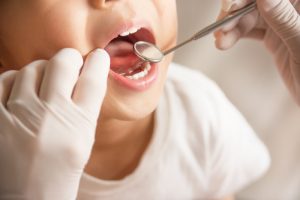What To Do If Your Child Has A Mesiodens Tooth
Fake Braces Epidemic
April 19, 2019The Six Most Common Orthodontic Problems
May 2, 2019
As a child’s mouth and teeth develop, occasionally an extra tooth, or mesiodens, will grow between the two top front teeth in the mouth. Not only does a mesiodens create an undesirable aesthetic factor, but it can also damage the growth of future permanent teeth and interfere with proper alignment. The mesiodens will almost always be removed to prevent further damage to adjacent teeth and allow for healthy dentition. If your child has an extra tooth growing between their front teeth, read on to find out what options you have and what you need to do to get the tooth extracted!
What Is A Mesiodens Tooth?
As children’s mouths develop and their teeth begin to erupt, some might experience an extra tooth growing in where it should not be. A supernumerary, or extra, tooth is one of a few developmental problems that children can experience. The most common supernumerary teeth that develops is called a mesiodens, which is an extra tooth that most often grows between the two top front teeth. You are more likely to develop a mesiodens tooth if other family members have had one. Although some scholars point to genetics as the cause, it could also result from an overactive dental lamina, which is the tissue that appears at the very beginning of the tooth development stage. It could also stem from the division of a single tooth bud, but direct causes are still relatively unknown. Interestingly enough, mesiodens are more likely to develop in males than females, although it is still a rare occurrence. Early intervention is always needed with a mesiodens tooth before it can interfere with the alignment and eruption of permanent teeth that develop later on in a child’s life. It also can influence the development of cysts, malocclusion and food impaction, so early detection is important for overall oral health. Removing the tooth is the most common way to avoid damage to other teeth and fix the aesthetic look of the mouth. Once the extra tooth is removed, dentition can continue normally with the patient rarely having any side effects.
Treatment Options
As mentioned, removal of the mesiodens tooth is paramount in maintaining good oral health. Mesiodens can be detected by X-rays, so most dentists recommend a single or panoramic view X-ray by the time the child is 5 years of age for proper diagnosis. Dental checkups for little ones should begin by age 1, or when their first tooth erupts, whichever occurs first. From there, you should bring your child in every six months for a dental evaluation, which will help tremendously in identifying and treating any supernumerary teeth that may develop. Your dentist may need to take multiple X-rays to determine the severity and depth of the mesiodens, but careful radiographic examinations are an important step in properly removing the tooth.
Intervention before age 5 lessens the chance of surgical complications and misalignment of permanent teeth, thus reducing the need for orthodontic care. The root of the mesiodens is not completely developed at this age, making it an ideal time for removal as it will improve the healing time. In most cases, your child will be referred to an oral surgeon who will perform the procedure under general anesthesia, using advanced technology and tools for successful extraction. Once removed, it could take between six months to three years for the unerupted tooth to erupt where the mesiodens was previously located, dependent upon the type and position of the unerupted tooth and the space available.
Importance of Regular Dental Checkups
While a mesiodens tooth is rare, it is still important for your child to have regular dental checkups to monitor for the development of a mesiodens and begin treatment as quickly as possible. Supernumerary teeth cause many complications as they can delay and disrupt permanent teeth, damage tooth roots and inhibit orthodontic treatment. Parents play an essential role in helping their child develop healthy permanent teeth. Committing to bringing your child in every six months for a dental checkup will help you develop trust with your child’s dentist, allow them to monitor your child’s teeth and prevent any decay from developing. With or without extra teeth, brushing and flossing should be a daily routine that your child needs to start at a young age. Good oral hygiene at home will make for better and quicker dental checkups, plus it will teach kids early on how to take care of their oral health.
If your child has developed a mesiodens tooth or is in need of a dental examination, call Hardy Pediatric Dentistry & Orthodontics at (720) 887-6003! Our team is dedicated to your child’s oral health and is ready to help them get the healthiest and happiest smile possible!